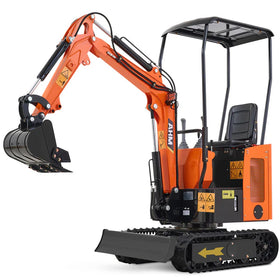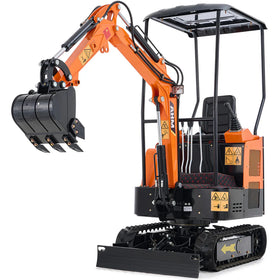So, the landscape designer starts throwing around terms - "we'll handle the hardscaping first, then move to landscaping elements."
You nod along, but what's actually the difference?
Landscaping vs hardscaping isn't complicated once you understand the basics.
- Landscaping covers all the living elements - grass, flowers, trees, and shrubs that grow and change with the seasons.
- Hardscaping, on the other hand, refers to the non-living structures like patios, walkways, retaining walls, and decks built from concrete, stone, pavers, or wood.
Both work together to create functional outdoor spaces, but they require different skills, equipment, timelines, and budgets to execute properly. What machines work best for it? We’ve got you covered!

Landscaping vs Hardscaping: Definitions
What is Landscaping?
Landscaping involves designing, installing, and maintaining the living, organic components of outdoor spaces. This includes everything from lawn care to elaborate garden designs with trees, shrubs, perennials, and annuals.
Key landscaping projects:
- Lawn installation (sod or seed)
- Flower bed creation and planting
- Tree and shrub planting
- Mulching and soil improvement
- Garden design and plant selection
- Irrigation system installation
- Seasonal plant maintenance
What is Hardscaping?
Hardscaping uses durable, non-living materials to create permanent structures and functional spaces in your yard. These are the areas where you actually walk, sit, and entertain.
Key hardscaping projects:
- Patio installation (concrete, pavers, flagstone)
- Walkway and pathway construction
- Driveway installation or resurfacing
- Retaining walls for slope management
- Deck construction
- Fire pit installation
- Outdoor kitchen structures
- Pergolas and gazebos
- Fencing and gates
Landscaping Projects vs Hardscaping Projects
| Aspect | Landscaping (Softscaping) | Hardscaping |
| Materials | Living plants, grass, trees, shrubs, flowers, mulch, soil | Concrete, pavers, stone, brick, wood, metal, gravel |
| Primary Purpose | Aesthetic beauty, environmental benefits, shade, and biodiversity | Functional spaces, structure, walkable surfaces, and property lines |
| Maintenance | High-watering, mowing, pruning, fertilizing, and seasonal replanting | Low - occasional cleaning, sealing, and repair of cracks or settling |
| Lifespan | Changes seasonally, plants require replacement every 1-10+ years | Permanent - patios last 20-30+ years, decks 15-25 years |
| Environmental Impact | Absorbs CO2, provides oxygen, prevents erosion, and cools urban areas | Can increase water runoff, requires permeable options for drainage |
| Timeline | Plant establishment takes 1-3 growing seasons for full maturity | Immediate results - completed projects are instantly functional |
Landscaping vs Hardscaping: Key Differences
| Factor | Landscaping | Hardscaping |
| Average Cost | $800-$10,000 | $2,000-$45,000 depending on project (patios, walkways, walls) |
| Cost Per Square Foot | $4.50-$20 per sq ft for full landscape design and installation | $5-$50 per sq ft (gravel paths $1-3, paver patios $12-25, retaining walls $20-50) |
| Labor Rates | $50-$100 per hour for landscape contractors | $50-$120 per hour for hardscape contractors (higher due to complexity) |
| Project Timeline | Small projects: 1-3 days; Full redesign: 1-2 weeks | Small paths: 1-2 days; Patios: 2-7 days; Large decks: 1-2 weeks |
| DIY Difficulty | Moderate - planting requires some knowledge, but manageable | High - excavation, footings,and drainage require technical skill |
| Equipment Needed | Shovels, wheelbarrows, tillers, spreaders | Mini excavators, skid steers, plate compactors, concrete mixers |
| Permits Required | Rare ($50-$400 for grading only) | Common ($60-$2,000 for permanent structures, footings, concrete) |
| ROI at Resale | 10-30% property value increase | 10-30% property value increase (both improve curb appeal) |
| Seasonal Work | Best in spring for planting, fall for pruning | Year-round (weather permitting), avoid freeze-thaw periods |
| Long-Term Costs | High - ongoing water, fertilizer, replacement plants, lawn care | Low - occasional sealing, crack repair, and power washing |
Mini Excavators vs Mini Skid Steers for Landscaping
When handling landscaping projects, equipment choice depends on whether you're digging or moving materials.
Mini skid steers work better for:
- Spreading topsoil and mulch across garden beds
- Moving plants and trees around the property
- Grading and leveling soil for lawn installation
- Loading and transporting debris during cleanup
- Light surface excavation (6-12 inches deep maximum)
Mini excavators excel at:
- Digging planting holes for large trees (2-4 feet deep)
- Excavating pond areas and water features
- Creating drainage trenches and French drains
- Removing tree stumps and large root systems
- Shaping terrain and creating berms or raised beds
- Precision grading for proper water runoff
Mini Excavators vs Mini Skid Steers for Hardscaping
Hardscaping projects require both excavation and material handling.
Mini skid steers can handle:
- Moving pallets of pavers and retaining wall blocks
- Spreading and grading crushed stone base material
- Transporting sand for bedding layers
- Loading debris from demolition work
- Final grading and surface preparation
Mini excavators can handle:
- Excavating patio footers
- Digging retaining wall foundations
- Removing old concrete patios or walkways
- Shaping slopes and creating terraced areas
- Lifting heavy natural stones and boulders into position
AHM Mini Excavators and Mini Skid Steers for Landscaping and Hardscaping
Mini excavators handle precision digging work for both categories - planting holes, stump removal, and patio excavation benefit from 69-inch digging depths and around 2,585+ lbf force in models like the AHM AX-12B.
Mini skid steers excel at material transport and spreading. Most professional landscape and hardscape operations use both machines, with excavators handling deep soil work and skid steers managing the constant material movement.
1. AHM AX-12B Mini Excavator - $5,399.99
The AX-12B is perfect for residential landscaping and hardscaping work. Weighing 2,138 pounds with a 37-inch width, it accesses tight backyard spaces while delivering 69-inch digging depth and 2,585 lbf of digging force to power through tough soil conditions. The fuel-efficient Briggs & Stratton engine costs just $2-3 per full workday.
- Excavating patio areas with 6-8 inch uniform depths
- Digging planting holes for large trees and shrubs
- Creating water features, ponds, and streams
- Removing tree stumps and root systems
- Installing drainage systems and French drains
- Breaking up and removing old hardscaping
AHM AX-15 Mini Excavator - $7,999.99
The AX-15 steps up to commercial-grade reliability with a Kubota D722 engine that outlasts standard engines by three times. Built for landscape contractors running equipment 40+ hours weekly, it delivers 2,698 lbf digging force with EPA Tier 4 compliance and 50% reduced emissions through the Enhanced Three Vortex Combustion System.
- Superior Kubota engine longevity for daily commercial use
- EPA Tier 4 emissions compliance for municipal contracts
- 69-inch depth and 120-inch reach (matching AX-12B)
- 36-inch width for tight residential access
- External hydraulic hoses for simplified maintenance
- 25-year proven track record in construction applications
AHM SS-38 Mini Skid Steer - $6,799.99
The SS-38 tackles the material movement and grading that consumes 40% of project time. With 827 lb lift capacity and 5.4 cu. ft. bucket, it efficiently moves pallet loads of pavers, bulk materials, and soil amendments. The universal attachment system works with 100+ attachments, switching between tools in under 60 seconds.
- 827 lb lift capacity for pallets and bulk materials
- 5.4 cu. ft. bucket capacity for efficient material movement
- 3.7 mph travel speed for quick repositioning
- 30-degree climbing ability for sloped properties
- 23 HP Briggs & Stratton engine
- 45.3-inch width navigates between landscape features
- Tool-free maintenance access
The Bottom Line
Landscaping vs hardscaping comes down to living plants versus permanent structures - landscaping creates natural beauty through grass, flowers, and trees requiring ongoing maintenance, while hardscaping builds functional spaces with patios, walkways, and walls that last decades with minimal upkeep.
Costs range from $800-$10,000 for landscaping versus $2,000-$45,000 for hardscaping, with hardscape projects generally requiring permits, specialized equipment, and professional installation.








